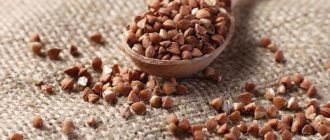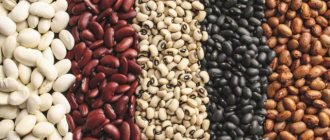Carotenoids are present in many plant foods. Despite this, it is quite difficult to create a tasty and at the same time healthy diet. In addition to the fact that the diet should be as varied as possible, you need to know where carotene is found and in what form it is best absorbed, as well as have information about the symptoms of a deficiency or overdose of the substance.
Nutritional value, composition and calorie content of carrots
100 grams of raw carrots contain (% of the recommended daily intake) ():
- Calorie content: 41 kcal (2%).
- Carbohydrates: 9.6 g (3%).
- Fat: 0.2 g (0%).
- Protein: 0.9 g (2%).
- Fiber: 2.8 g (11%).
- Vitamin A: 16,705 IU (334%).
- Vitamin C: 5.9 mg (10%).
- Vitamin K: 13.2 mcg (16%).
- Thiamine: 0.1 mg (4%).
- Niacin: 1 mg (5%).
- Vitamin B6: 0.1 mg (7%).
- Folic acid: 19 mcg (5%).
- Phosphorus: 35 mg (4%).
- Potassium: 320 mg (9%).
- Manganese: 0.1 mg (7%).
- Omega-3 fatty acids: 2 mg.
- Omega-6 fatty acids: 115 mg.
Raw carrots also contain trace amounts of vitamins and minerals such as vitamin E, riboflavin, pantothenic acid, choline, betaine, calcium, iron, magnesium, sodium, zinc and copper.
Root vegetable with antioxidant
It is well known what important beneficial qualities vitamin C has, producing collagen, which preserves youth and shine of the skin. In addition, this substance helps strengthen the immune system;
The root vegetable has a strong antioxidant E, which protects a person from carcinogens and has a positive effect on the skin;
The product is rich in vitamin K, which has a beneficial effect on bone regeneration, which is quite important for people suffering from osteoporosis.
This substance helps strengthen blood vessels, regulates the activity of the gastrointestinal tract, has an excellent effect on muscles and weakens the effect of harmful elements on the human body.
The benefits of carrots for the human body
Regular consumption of carrots or carrot juice benefits the body in many amazing ways. Here are the benefits of carrots:
Protects eye health
Carrots contain three important nutrients that greatly contribute to eye health - beta-carotene, lutein and zeaxanthin. For example, without beta-carotene (a form of vitamin A), a variety of eye diseases can occur, including macular degeneration and even blindness. Meanwhile, lutein and zeaxanthin help reduce the risk of age-related vision loss.
Just 100 grams of peeled raw carrots provides the body with 334% of the recommended daily intake of vitamin A! This root vegetable contains vitamin A in the form of beta-carotene. Vitamin A is one of the most important nutrients needed to protect eye health and vision, especially as we age.
Vitamin A deficiency can lead to night blindness and then permanent blindness. Vitamin A deficiency is actually the leading cause of preventable blindness worldwide. Carrots may also reduce the risk of cataracts and macular degeneration, which are common causes of age-related vision loss ().
Regular consumption of carrots and carrot juice helps maintain eye health and vision throughout your life. If eating raw carrots doesn't sound appealing to you, remember that drinking carrot juice is just as good for your eye health.
Carrots contain antioxidants (especially beta-carotene)
Carotenoids found in carrots and other orange vegetables are powerful antioxidants that may help reduce the risk of developing various forms of disease, including serious chronic diseases. Carrots and carrot juice help the immune system protect the body from free radical damage, harmful bacteria, viruses and inflammation.
Antioxidants that are responsible for the beneficial properties of carrots and carrot juice are: vitamin C, beta-carotene, lycopene, lutein, zeaxanthin. This orange vegetable is one of nature's richest sources of carotenoids and beta-carotene, which fight cancer by stopping DNA damage and cell mutation, and reducing inflammation levels ().
Reduces the risk of cardiovascular disease and stroke
Eating vegetables that have a deeper orange color, such as carrots, reduces the risk of developing cardiovascular disease, especially in adult women. Research shows that drinking carrot juice benefits heart health by reducing oxidative stress and improving the body's defenses against various types of cardiovascular disease ().
This effect is likely due to the high levels of antioxidants found in carrots. Its consumption also helps reduce cholesterol levels and increase bile production, which improves the body's ability to digest fat. Not only does this help your digestive system properly absorb nutrients from the foods you eat, but it also directly affects your body's levels of "good" HDL cholesterol, which protects your entire cardiovascular system ().
Helps protect against cancer
Evidence suggests that getting plenty of carotenoids from fruits and vegetables may protect against cancer recurrence. Research shows that these antioxidants in carrots can fight leukemia and may play a role in reducing the risk of some of the most common cancers, including ovarian and breast cancer (,).
One study observed the effects of drinking 240 ml of fresh orange and carrot juice daily for three weeks on women with a history of breast cancer.
The results showed that daily consumption of fresh carrot juice contributed to the body's protection against cancer and was an effective approach to increasing carotenoid antioxidant levels in the blood. This, in turn, helps reduce oxidative stress and inflammation, which protects against the development of cancer ().
Supports Oral Health
The nutrients present in carrots help strengthen the immune system, including the body's ability to fight bacteria and toxins that enter the mouth and live on the gums and teeth. Some minerals present in this vegetable have antibacterial properties and help prevent caries and tooth decay ().
Carrots can also help remove plaque and stains from teeth when eaten after eating. After eating this vegetable, the fiber in its composition also improves immunity by clearing the intestines of unwanted bacteria and promoting better absorption of immunity-boosting nutrients.
Improves skin health and accelerates wound healing
Beta carotene is critical for healing any type of wound. Carrots have been used for centuries as a poultice to promote wound healing due to their high beta-carotene content ().
If you have any skin infections, cuts or other wounds, you will find that carrots and carrot juice benefit your skin by increasing the rate of healing and increasing the body's ability to quickly deal with infection and noticeable signs of skin inflammation.
Improves brain health and cognitive function
Carrots and carrot juice benefit brain health by helping prevent Alzheimer's disease, improving memory, and protecting against other types of cognitive decline. This is because this vegetable has the ability to reduce oxidative stress in the brain, which can weaken the nervous system's capacity ().
Daily value of beta-carotene
It is recommended for an adult to consume at least 5 mg of provitamin A per day. It should be borne in mind that the substance is not completely absorbed and some of it is simply lost.
In some circumstances, significantly more beta-carotene is required:
- severe vitamin A deficiency;
- pregnancy and breastfeeding;
- serious sports and mental stress;
- stress or periods of illness;
- predisposition to cardiovascular diseases and atherosclerosis;
- cancer alertness;
- living in environmentally unfavorable areas or working in hazardous industries;
- increased eye strain, especially in children and students.
According to doctors, in the cases considered, exceeding the average daily norm of beta-carotene is quite justified. In addition, large portions of provitamin A are completely safe for the body and can only lead to temporary yellowing of the skin. You can get rid of this unpleasant phenomenon by simply adjusting your diet.
Benefits of carrot juice for the human body

One of the biggest reasons why people avoid eating a lot of vegetables is that they are short on time. If you have little time for cooking and don't always have the opportunity to prepare a fresh salad or other dish using carrots, fresh carrot juice may be a great option for you.
Concentrated amounts of nutrients
Drinking fruit and vegetable juices provides a large dose of nutrients and enzymes. As people have learned more about the benefits of carrot juice for the human body, carrots have become one of the most beloved additions to any homemade fresh juice.
Benefit for health
Carrot juice benefits your health when you consume it on a regular basis because it can quickly and effectively add important micronutrients to your diet.
Drinking carrot juice regularly can improve your immunity, energy levels and digestion. It can also help you lose weight by eliminating nutritional deficiencies that contribute to overeating. Overeating is due to the fact that the body, when it is deficient in nutrients, requires more food to obtain more microelements.
Facilitates digestion
Drinking carrot and other types of vegetable juices can help the digestive tract absorb nutrients more easily since their fiber has already been broken down and the body has to work less to absorb vitamins and minerals. This is important given the fact that many people have digestive problems and digestive tract diseases such as irritable bowel syndrome (IBS) due to years of eating junk food that overloads the digestive system.
Most high-quality juicers process vegetables to the point where their nutrients are instantly absorbed. This means that once nutrients enter your stomach, they are quickly absorbed into the bloodstream and place little or no strain on the stomach, intestines, liver, and other digestive organs.
Carrot juice - pay attention
Carrot juice is a truly inexhaustible source of important and necessary elements for the body, just like its fruit. The amount of juice ingested is determined by the state of health. It helps maintain a tan thanks to the presence of beta-carotene. Before going to the beach, experts recommend taking the juice of this root vegetable.
It has a healing effect on the activity of the pancreas and respiratory system.
This juice helps strengthen nails and hair, and also increases the body's resistance to colds.
For those with liver problems
The daily dose of vitamins and microelements is replenished by eating 150 - 250 g of root vegetables.
For people with liver dysfunction, it is necessary to eat carrots in larger quantities, since the absorption of healing elements with this disorder is reduced many times over.
It must be remembered that the largest amount of vitamins is located in the peel of the root vegetable, therefore there will be more benefits if you do not peel it, but rinse it well and use it in this form.
Harm of carrots to the human body
Although carrots are good for the body, consuming them in excess can cause some unwanted side effects. Here's why carrots are harmful:
Carotenemia
Carrots are very rich in beta-carotene, which is one of several carotenoids that your body converts into vitamin A. Eating large amounts of this vegetable does not put you at risk of overdosing on vitamin A because your body only converts beta-carotene when needed.
However, the presence of large amounts of carotene in the blood can lead to carotenemia, which is a yellow coloration of the skin. The harmless condition usually appears on the palms, soles and ears and gradually disappears as carotene intake decreases.
Changes in the intestines
Carrots are a good source of fiber (dietary fibre). Insoluble dietary fiber, which binds to water and promotes efficient digestion and regular bowel movements, makes up more than 80% of the fiber in raw carrots. Even a small increase in dietary fiber can temporarily disrupt your bowel movements.
Consuming large amounts of insoluble fiber can lead to loose stools until your digestive system adjusts to the higher level of fiber intake. A high intake of insoluble fiber can also lead to constipation if you don't drink enough fluids to help fiber move through your gastrointestinal tract.
Potential Side Effects
Eating too much of any food often involves a restricted diet or a diet that excludes other healthy foods. Carrots can help you get plenty of vitamin A, dietary fiber, potassium, magnesium and vitamins C, B6 and K, but they are not a particularly good source of most other nutrients, including calcium and iron.
This vegetable is also low in fat, nutrients that are essential to your body's ability to absorb and use beta-carotene as well as vitamin A. By diversifying your diet with plenty of natural, whole foods and eating them in moderation, you can best meet your body's needs. in nutrients and avoid the possible negative consequences of overeating individual foods such as carrots.
History of carrots

Carrots are considered one of the most important cultivated vegetable crops in history. This root vegetable has provided nutrients to the world's population for thousands of years, and records show that the first modern varieties of carrots were consumed around the 10th century in parts of the Middle East and Asia.
Even before this time, many types of wild carrots (some sources say about 80 different types) were consumed in countries such as Persia, Turkey, Iran and areas of Asia Minor.
Today, there are two main types of cultivated carrots: Eastern/Asian (purple-colored) and Western (orange-colored).
Eastern carrots are commonly found in Afghanistan, Russia, Iran and India, while Western carrots are found in Europe, North and South America. Both types belong to the Daucus carota species and have similar beneficial properties. Compared to carrots that grew thousands of years ago, modern carrots are considered sweeter, more attractive in appearance, and better able to fend off pests and insects as they grow ().
Some people avoid eating carrots because they believe they contain a lot of sugar and can raise blood glucose levels. However, this is far from true - 100 grams of this vegetable contains only 9.6 g of carbohydrates and almost 3 g of fiber. The fiber in carrots helps slow the release of sugar in the form of glucose into the bloodstream.
Including carrots in a healthy diet may even be safe for people with diabetes because eating this vegetable prevents any spike in blood sugar levels. However, diabetics or people who may have trouble balancing their blood sugar levels should limit their intake of carrot juice as carrot juice contains higher amounts of sugar and does not contain fiber.
Which carrots are best to eat?
It is best to consume organic carrots if possible. Packaged carrots are usually washed in a mild chlorine solution, so they shouldn't be your priority despite their clean appearance. Instead, try purchasing and consuming organic carrots in whole or juice form.
In addition to buying orange carrots, also look for colorful versions of this vegetable, as they can be very sweet and tasty. You don't need to peel carrots since many of the nutrients and fiber are found in the peel. Simply use the brush to scrub it thoroughly and remove dirt and debris.
Professional nutritionists recommend buying organic carrots grown without the use of synthetic fertilizers. Root vegetables like carrots grow in soil and are able to absorb any toxins and pesticides present in the soil.
When you make carrot juice, you consume a large amount of carrots at one time; this means that if there are toxins present, you will also be consuming large amounts of those chemicals, which may reduce the benefits of carrot juice.
According to sources, residual levels of toxic pesticides are found in much higher levels in conventionally grown carrots than in organically grown ones. The Environmental Working Group created a list of the 51 most popular fruits and vegetables based on the degree to which they are contaminated with pesticides - carrots ranked 25th among the most contaminated vegetables and fruits ().
Therefore, to get the most benefits from eating carrots and carrot juice without consuming high levels of toxins, always try to buy organically grown carrots.
Ways to eat carrots
If you're looking to include carrots in your diet, nutrition experts recommend consuming them in a variety of ways to get the most benefits.
Raw carrots
The fiber content of raw carrots may be higher because they are broken down when cooked. Raw carrots make a great snack, so try packing a few in a plastic bag and taking them to work as a snack.
Boiled carrots
It is also important to consume cooked carrots in addition to raw carrots and carrot juice, as some studies have shown that cooked carrots may have higher antioxidant activity than raw carrots. Balance carrot juice with other vegetable juices that contain lower amounts of carbohydrates. Add carrots to soups, stews, or simply lightly cook them in coconut oil for a delicious side dish.
carrot juice
Juicing is a great way to incorporate carrots into your diet, but don't overdo it since carrot juice has little to no fiber and is high in sugar.
Orange beauty - as a cosmetic product
The product will help women with dry skin: grate carrots and mix with yolk, apply to face and rinse after 15 - 30 minutes.
If you want to get rid of freckles, acne or relieve skin irritation, then combine carrot juice and lemon juice.
A decoction from the tops of the root vegetable is healing for hair - rinse clean hair, tie it with a scarf and go to bed.

Summarize
- Carrots are the perfect crunchy, delicious snack that is rich in nutrients and low in calories.
- Eating this vegetable has been linked to a variety of benefits in terms of heart and eye health, improved digestion, and a reduced risk of cancer.
- There are several types of carrots in different colors, sizes and shapes that are a great addition to a healthy diet.
Tags: Carrot
- Related Posts
- Spinach and kale: which is healthier?
- Horseradish: benefits and harm to human health
- Are carrots good for your eyes?
« Previous entry











